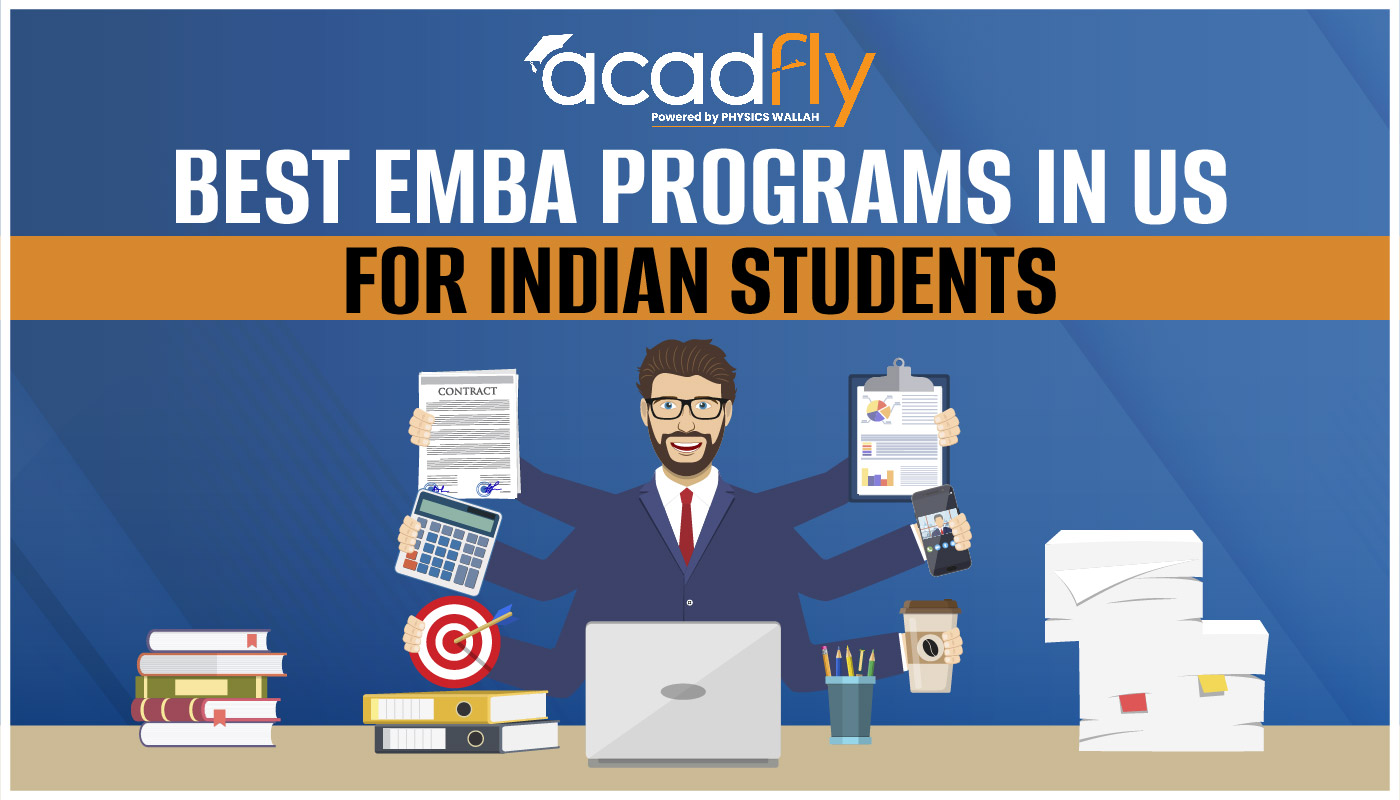
Best EMBA Programs in the US for Indian Students
For Indian students looking to enhance their managerial skills and advance in their careers, Executive MBA (EMBA) programs in the United States offer prestigious options that combine flexibility with a rigorous curriculum. Here, we explore the best EMBA programs in the US, examining the top universities, eligibility criteria, and reasons to pursue these programs.

EMBA programs in the US Overview
Here is an overview of the Executive MBA (EMBA) programs in the USA, incorporating key aspects such as program type, duration, eligibility criteria, potential job roles, tuition fees, average salary, and top recruiters.
Aspect |
Details |
Program Type |
Full-time, Part-time, Offline, Online |
Duration |
22 to 24 months |
Program Eligibility Criteria |
Minimum 3.0 GPA on a scale of 4.0, GMAT scores between 640 to 740 |
Job Roles |
Product Manager, Administration Manager, HR Manager, Executive Manager, Entrepreneur, International Business Specialist |
Tuition Fees (Annual) |
$106,000 to $239,000 |
Average Annual Salary |
Approximately USD 266,000 (INR 2,18,93,263) |
Top Recruiters |
Amazon, IBM, BCG, Accenture, Oracle, Deloitte, JPMorgan Chase & Company |
List of the Best EMBA programs in the US
The United States hosts several top-tier EMBA programs renowned for their academic excellence and strong alumni networks. Here’s a look at some of the best EMBA programs in the US:
-
University of Pennsylvania (Wharton)
-
University of Chicago (Booth)
-
Northwestern University (Kellogg)
-
Columbia University
-
New York University (Stern)
-
Duke University (Fuqua)
-
MIT (Sloan)
-
University of California—Berkeley (Haas)
-
University of Michigan—Ann Arbor (Ross)
-
UCLA (Anderson)
Top Universities and Programs in Table Format
|
University |
Program Name |
|
University of Pennsylvania (Wharton) |
Wharton EMBA |
|
University of Chicago (Booth) |
Chicago Booth EMBA |
|
Northwestern University (Kellogg) |
Kellogg EMBA |
|
Columbia University |
Columbia EMBA |
|
New York University (Stern) |
Stern EMBA |
|
Duke University (Fuqua) |
Fuqua Global Executive MBA |
|
MIT (Sloan) |
Sloan Fellows MBA |
|
University of California—Berkeley (Haas) |
Berkeley EMBA |
|
University of Michigan—Ann Arbor (Ross) |
Ross EMBA |
|
UCLA (Anderson) |
Anderson EMBA |
Eligibility Criteria To Enroll in Best EMBA Programs in the US
While the specific requirements can vary from one program to another, most EMBA programs have common eligibility criteria. Here is the minimum requirement that candidates must meet to get admission in the best EMBA programs in the US:
-
Work Experience: Typically, a minimum of 5-10 years of professional experience is required, with some programs expecting managerial experience.
-
Academic Record: A bachelor's degree from an accredited institution is necessary.
-
GMAT/GRE Scores: Some programs may require GMAT or GRE scores, though many are waiving this requirement in light of recent global events.
-
Leadership Potential: Demonstrated leadership skills and potential for growth are heavily weighted.
-
English Proficiency: For non-native speakers, proficiency in English, often evidenced by TOEFL or IELTS scores, is crucial.
Why Study EMBA in the US?
Studying an EMBA program in the US offers several advantages:
-
Global Networking Opportunities: Connect with professionals from around the world, enhancing your global business perspective and networking circle.
-
Leadership Development: Focus on executive skills and strategic decision-making to prepare for senior management roles.
-
Flexibility for Working Professionals: Programs are designed to fit the busy schedules of working executives.
-
Innovative Learning Environment: Access to state-of-the-art facilities and resources at some of the world’s leading universities.
-
Career Advancement: Graduates often see significant advances in their careers, whether in terms of position, scope of work, or salary.
Bottom Line
Choosing the right EMBA program requires careful consideration of your career goals, lifestyle, and financial situation. These programs offer a transformative experience with the potential to significantly impact your professional trajectory. If you need guidance or assistance in navigating through the options available to you, don't hesitate to reach out to AcadFly counsellors for personalized advice tailored to your needs and aspirations.
FAQs
How long does it take to complete an EMBA program?
Typically, EMBA programs last between 18 to 24 months.
Can I work full-time while pursuing an EMBA?
Many top EMBA programs in the USA are specifically designed for working professionals to balance their studies with full-time employment.
Are there scholarships available for Indian students?
Yes, many programs offer scholarships and financial aid options, including those specifically for international students.
Is attending classes on campus mandatory?
While some best MBA in the US require on-campus classes, many incorporate flexible scheduling and some online sessions.
What is the typical cohort size in EMBA programs?
Cohort sizes vary, but they are generally smaller than traditional MBA programs, offering a more personalized learning experience.
Frequently Asked Questions









